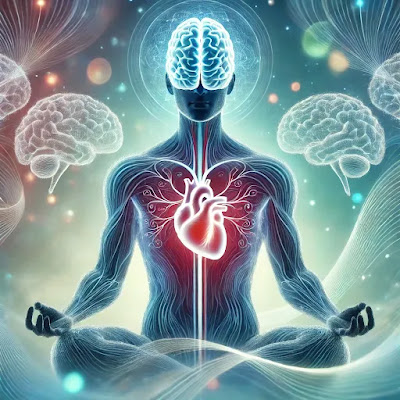Combine your body with your mind: unlocking the unbelievable power 🍁
The Mind-Body Connection: Unlocking the Power of Holistic Wellness
In a world that often separates the mind from the body, the concept of the mind-body connection is a refreshing reminder of how deeply intertwined (connected) our mental and physical health truly are. Ancient philosophies and modern science alike agree: the mind and body do not function independently. Instead, they work harmoniously, influencing each other in profound ways.
As the renowned philosopher Plato once said:
"The part can never be well unless the whole is well."
Let’s dive into the fascinating world of the mind-body connection and discover how nurturing your mental and physical well-being can lead to a healthier, more balanced life.
Did you know ?
The Science Behind the Mind-Body Connection
At the heart of the mind-body connection is the central nervous system, which acts as the bridge between our mental states and physical health. Emotions and thoughts trigger biochemical responses that can impact bodily functions. For example:
- Stress and Cortisol: Chronic stress leads to elevated cortisol levels, causing inflammation, high blood pressure, and even heart disease.
- Positive Thinking and Endorphins: Optimistic thoughts increase endorphin production, boosting mood and reducing pain perception.
- Anxiety and the Gut: Ever felt “butterflies” when nervous? That’s your gut reacting to stress, as it houses millions of neurons connected to your brain.
The Role of Emotions in Physical Health
Research shows that emotional well-being significantly impacts physical health outcomes. Here’s how:
- Chronic Anger: Increases the risk of heart disease and hypertension.
- Anxiety and Depression: Can suppress the immune system, making you more susceptible to illnesses.
- Happiness and Gratitude: Associated with lower levels of inflammation and better cardiovascular health.
"The mind has great influence over the body, and maladies often have their origin there."— Molière
The Power of Practices That Strengthen the Mind-Body Connection
Incorporating specific practices into your routine can dramatically improve both mental and physical health. Here are some proven techniques:
1. Meditation and Mindfulness
Meditation helps regulate the body’s stress response by activating the parasympathetic (part of the autonomic nervous system) nervous system. Regular practice can lower cortisol levels, reduce anxiety, and improve sleep quality.
- Try guided meditation apps like Headspace or Calm to get started.
- Practice deep breathing to calm your mind and relax your muscles.
2. Physical Exercise
Exercise releases endorphins, which act as natural mood boosters. Activities like yoga, Tai Chi, and even walking can enhance both physical fitness and mental clarity.
- Yoga: Combines physical movement with mindfulness, promoting emotional balance.
- Cardio Workouts: Reduce symptoms of depression and anxiety.
"Movement is a medicine for creating change in a person’s physical, emotional, and mental states."
— Carol Welch
3. Journaling and Emotional Release
Writing down your thoughts and feelings can help you process emotions and reduce mental clutter. Journaling is particularly effective in reducing stress and promoting self-awareness.
- Practice gratitude journaling to shift your mindset positively.
- Use reflective journaling to analyze emotions and triggers.
4. Nutrition for Mental Wellness
The gut-brain axis is a powerful example of the mind-body connection. A healthy gut microbiome can reduce anxiety and improve mood.
- Consume probiotic-rich foods like yogurt and fermented vegetables.
Include omega-3 fatty acids (like salmon and flaxseeds) to support brain function.
Real-Life Success Stories
Case 1: Mindfulness Meditation and Cellular Health
A study conducted by Alberta Health Services and the University of Calgary explored the impact of mindfulness meditation on breast cancer survivors. Participants engaged in an eight-week mindfulness-based cancer recovery program, which included meditation and gentle yoga. The results revealed that those who practiced mindfulness maintained the length of their telomeres—protective protein complexes at the end of chromosomes—while the control group experienced telomere shortening. Shortened telomeres are associated with aging and disease, suggesting that mindfulness practices can have a protective effect at the cellular level.
Case 2: Gut Health and Mental Health Improvement
Jane Dudley's experience highlights the link between gut health and mental well-being. After suffering from severe bipolar disorder for nearly two decades, Jane underwent a fecal microbiota transplant (FMT) using her husband's microbiota. Remarkably, after repeated procedures, her depressive symptoms progressively disappeared, leading to sustained remission from bipolar disorder. This case suggests that gut bacteria significantly influence mental health, opening new avenues for treatment.
Mind-Body Techniques in Modern Medicine
Modern medicine increasingly acknowledges the importance of holistic health approaches. Techniques like biofeedback, guided imagery, and cognitive behavioral therapy (CBT) are now used to treat physical and psychological conditions simultaneously.
Final Thoughts: Embrace the Harmony
Recognizing and nurturing the mind-body connection is essential for holistic health. Instead of treating the mind and body as separate entities, embrace practices that harmonize both.
As the great Buddha wisely stated:
"To keep the body in good health is a duty... otherwise we shall not be able to keep our mind strong and clear."
By prioritizing both mental and physical wellness, you can unlock a vibrant, balanced life where your mind and body work in unison to support your well-being.





Comments
Post a Comment